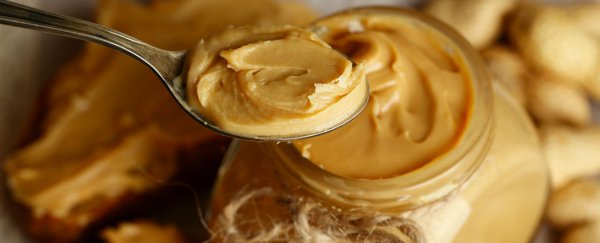A clinical trial of more than 600 kids at high risk of food allergies has shown that exposure to peanuts at a young age can actively halt the development of a peanut allergy.
But before we begin, please don't try this at home just yet, okay? Good.
The study was led by Gideon Lack, professor of paediatric allergy at King's College London in the UK, and was based on earlier research with children in Israel who were found to have lower rates of peanut allergy than Jewish children of a similar heritage who were growing up the UK. Lack's team hypothesised that the disparity came down to exposure at an early age - the Israeli children were unrestricted in eating peanuts, and various foods containing peanuts, while in the UK, the children were affected by the growing trend towards parents cutting out peanuts altogether 'just in case'.
To test this hypothesis, Lack and his colleagues compared two strategies for peanut allergy prevention: one was early consumption, and the other was complete avoidance. They worked with infants between four and 11 months ago who were particularly at risk of developing a peanut allergy, having already been diagnosed with severe eczema, an egg allergy, or both. They had their sensitivity to peanuts measured via a skin-prick test, and were then split into two groups. One group avoided peanuts until five years of age, and the other regularly ate at least 6 grams of peanut protein per week, throughout the same period, while being constantly monitored by healthcare professionals.
Reporting the results in the New England Journal of Medicine and today at the annual meeting of the American Academy of Allergy, Asthma and Immunology in Houston, the team says of the 530 infants who had negative results in the skin-prick test - so no signs of peanut sensibility - the prevalence of peanut allergy at five years of age was 13.7 percent in the avoidance group and 1.9 percent in the consumption group. Of the 98 kids who had positive peanut allergy results in the skin-prick test - so some sensitivity to peanuts - the prevalence of peanut allergy was 35.3 percent in the avoidance group by five years old, and 10.6 percent in the consumption group.
Overall the team found an 81 percent reduction of peanut allergy in participants who started eating peanut protein early in life and continuously, as compared to those who avoided it completely. They also found that increases in levels of a peanut-specific antibody occurred mostly in the consumption group.
"For a study to show a benefit of this magnitude in the prevention of peanut allergy is without precedent," Lack said in a press release. "The results have the potential to transform how we approach food allergy prevention."
Of course, this doesn't mean you should immediately run out and buy peanut butter so you can start dosing your kid up willy nilly. This was a carefully controlled study that put every precaution in place to ensure the safety of the participants. But the more studies like this that are done, the closer we could get to a future where treatments like this will become available to the public via their GP's. Lack's team will be continuing their trial across another 12 months to see how the results are affected by a longer period of consumption or avoidance.
